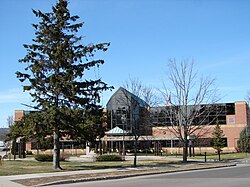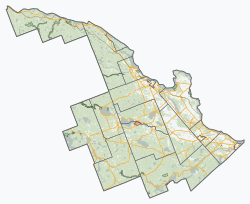Deep River | |
|---|---|
| Town of Deep River | |
 Town Hall in Deep River | |
| Nickname: Canada's Nuclear Pioneers | |
| Coordinates: 46°06′N 77°29.5′W / 46.100°N 77.4917°W | |
| Country | Canada |
| Province | Ontario |
| County | Renfrew |
| Founded | 1944 |
| Incorporated | 1959 |
| Government | |
| • Mayor | Suzanne D'Eon |
| • Federal riding | Renfrew—Nipissing—Pembroke |
| • Prov. riding | Renfrew—Nipissing—Pembroke |
| Area | |
| • Land | 50.27 km2 (19.41 sq mi) |
| Population (2021)[1] | |
| • Total | 4,175 |
| • Density | 832.0/km2 (2,155/sq mi) |
| Time zone | UTC-5 (Eastern Standard Time (EST)) |
| • Summer (DST) | UTC-4 (Eastern Daylight Time (EDT)) |
| Postal code | K0J 1P0 |
| Area code | 613 |
| Website | www |
Deep River is a town in Renfrew County, Ontario, Canada. Located along the Ottawa River, it lies about 200 kilometres (120 mi) north-west of Ottawa on the Trans-Canada Highway. Deep River is opposite the Laurentian Mountains and the Province of Quebec.
The name "Deep River" purportedly derives from the notion that the Ottawa River reaches its greatest depth of 402 feet (123 m) just outside the township. Although not official however, the Ottawa River reaches a depth of 565 feet (172 m) in Moose Bay which is located on the Holden Lake reservoir from the Des Joachim dam, west of Deux-Rivières.[2]
The primary industry centres on research at the Chalk River location of Canadian Nuclear Laboratories (CNL), a facility of the Chalk River Laboratories about 10 km east of Deep River on Highway 17. The facility is named for, and primarily accessed via, the nearby town Chalk River, although the site is technically in Deep River.
- ^ a b "Deep River, Ontario (Code 3547096) Census Profile". 2021 census. Government of Canada - Statistics Canada. Retrieved 2024-08-06.
- ^ Telea Dodge (27 October 2023). "How Deep is the Ottawa River?". a-z-animals.com. A-Z Animals. Retrieved 6 August 2024.

